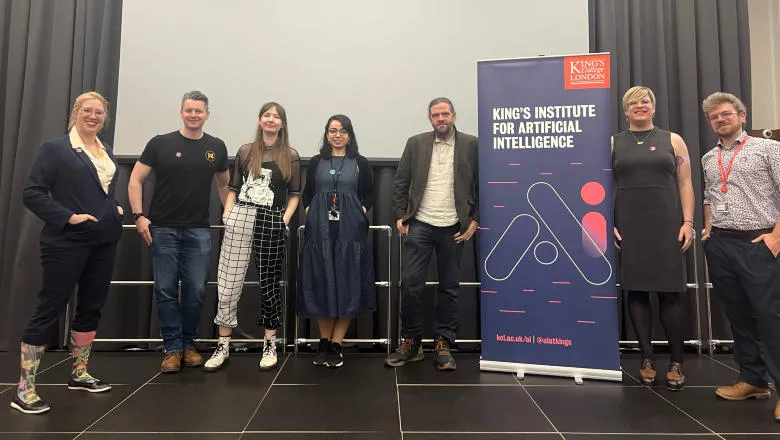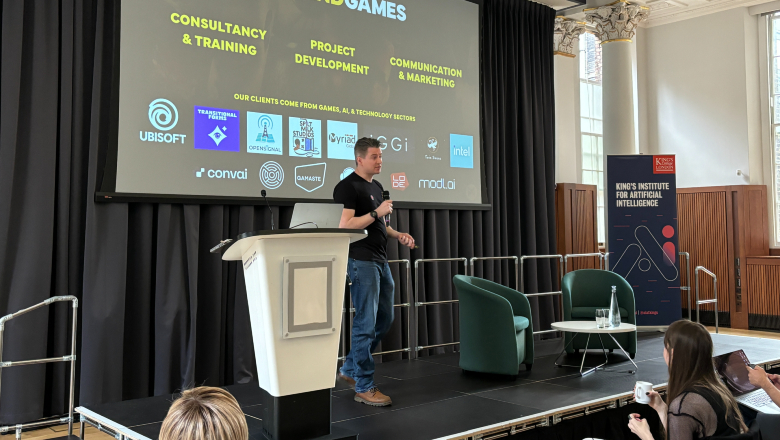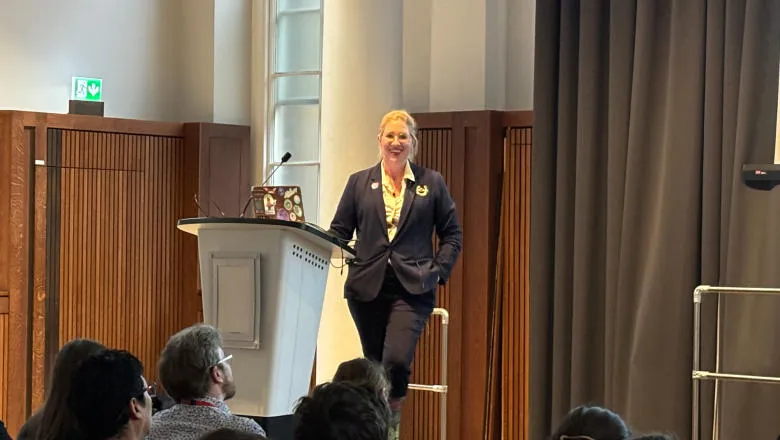12 November 2024
'Everyone plays games, they have for a long time' – King's delves into the future of AI and play at Next Level
Game developers and AI researchers came together to probe the impact of AI and science on the games industry in an interdisciplinary one-day conference.

Industry experts, cutting-edge researchers and YouTube personalities gathered in the Great Hall last month for a day of talks about the intersection of AI and the video game industry.
Organised by the King’s Institute for Artificial Intelligence and Dr Mike Cook, Senior Lecturer in Computer Science in the Department of Informatics, ‘Next Level: Exploring the future of science and games’ took the public on a tour of the past, present and future of artificial intelligence (AI) in video games, and their relationship with scientific discovery.
To begin the day, Dr Tommy Thompson, Founder of AI & Games, a start-up helping games studios in their own AI-enabled journeys, and its accompanying 200,000+ subscriber YouTube channel surveyed the history of AI in games and its likely trajectory.
The former King’s lecturer worked through the first use of AI in a video game, the 1973 strategy game Nim, through to the more recognisable Pac-Man and Doom to illustrate the way that AI has traditionally been built to enhance a games’ enjoyability through its non-player characters. With the advent of generative AI, Dr Thompson questioned why advances in Large Language Models like ChatGPT aren’t being used to write games, or why voice synthesizers are not being used to voice heroes and villains.
Ultimately, he said it was down to one main factor: risk. The regulatory framework of AI is ever changing, with text or art built using generative systems unable to be copyrighted, and therefore unable to be protected. The technology too is still premature, with the shadow of generative AI making offensive hallucinations too big a threat for business, ‘Don’t expect them to put ChatGPT is Call of Duty anytime soon’.

The event also spotlighted the way in which games are pushing forward the envelope of research, with postgraduate researcher Florence Smith-Nicholls looking at the archaeology of gaming – or archaeogaming. Delving into the potted past of real-world archaeology, Florence spoke about why the world of games, much like the real-world, left a rich material culture to be studied and that this virtual setting provides a rich parallel for modern archaeological techniques.
Dr James Wootton, Chief Scientific Officer of Moth, a start-up putting quantum computing into the hands of creatives, ran through what quantum computing can do for games and what games can do for quantum computers.
Starting with the basics of what a quantum computer is ‘Quantum computers – they’re like conventional digital computers, but quantum – there you go!’, Dr Wootton explained how the early days of emulating quantum technology on a smartphone are behind us. In fact, the additional processing power brought by the advent of quantum computing could seriously step up the procedural generation of graphics, text and even music – changing the future of games.
Lisa Kasatkina, Craft Lead for Quality Assurance at Jagex, developers of hit online role-playing game Runescape, pointed to the way that games grew as society develops, from chess, to solitaire on windows PCs and now mobile games found on smartphones – ‘Everyone plays games, they have for a long time’. By exploring how to stress test experiences and come to a collective agreement between players, developers and testers on what ‘fun’ looks like, she suggested that AI could have a place in the modern game development landscape, ‘breaking games creatively’.
Tackling the lack of meaning many creatives feel when working with generative AI, Dr Kate Compton called for a ‘Chekov’s gun’ like framework for how we use AI in the creative process, to move beyond simply creating ‘an art’.
Drawing on the narrative theories of Kurt Vonnegut and the city designs of Kevin Lynch, the generative artist, inventor and programmer, put forward a thesis on when to utilise AI in the creative process – as the gum to hold together the ‘girders’ of narrative framing that give a story structure, and the ‘gargoyles’ of raw emotional moments that make art and creation memorable.

King’s postgraduate researcher and founder of intersectionality feminist organisation feminist design, Sinem Görücü, presented her work on how the interactive storytelling inherent in games could help people engage with and design better cities. Drawing again from the urban conceptual devices of Kevin Lynch, from crossroads to neighbourhoods, Sinem and her team gamified town planning. They invited players to create their own settlements using game pieces mirroring these features in pursuit of points. These players were then awarded more points for the stories they could tell about their towns.
The team found that players attached so much more meaning to the spaces they created when twinning it with narrative, leading them to create more open and collaborative towns. Sinem also took the audience through her substantial meme library, both online and in pen and paper, co-designed with the community to highlight the importance of data literacy with a feminist lens.
Dr Cook ended the evening with a meditation on what it means for an AI to create something, through the medium of Pixie, his new AI engine which helps developers create better games for players. ‘The PR lines of generative AI has changed – we sit in the dangerous hinterland of some companies saying we don’t need to train to be an artist and the others saying we absolutely need artists in the loop to train these models – so where do we go?’
Mike argues that instead of threatening to replace artists, AI must work with them to help paint a future where technology unlocks their creativity, not destroy it. With AI platforms like Pixie, which suggests changes to games to make them more engaging, and then helps evaluate how fun that change really is he suggests the narrative could change here. ‘At their core, games are supposed to be fun. Pixie can make you think about how you make your games and how you reflect on the building process – treat it like an AI toolbox and embrace a helpful creativity boom.’
View the recordings of 'Next Level 2024: exploring the future of science and games' on YouTube. Next Level hopes to return next year. To read more about AI at King's, check out the King’s Institute for Artificial Intelligence.

